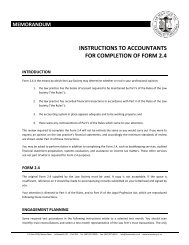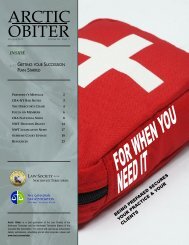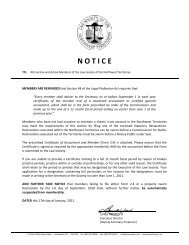ARCTIC OBITER
March/April 2012 - Law Society of the Northwest Territories
March/April 2012 - Law Society of the Northwest Territories
- No tags were found...
You also want an ePaper? Increase the reach of your titles
YUMPU automatically turns print PDFs into web optimized ePapers that Google loves.
MARCH/APRIL 2012 | 5<br />
FRAUD PREVENTION<br />
Bad Cheque Scams<br />
Fraudsters retain the firm on a contrived<br />
legal matter so that they can run a<br />
counterfeit cheque or bank draft through<br />
the firm trust account and walk away<br />
with real money. These contrived<br />
matters will look real. The fraudster will<br />
provide extensive and very real looking<br />
ID and documents. When the bad<br />
cheque or draft bounces, there will be a<br />
shortfall in the trust account.<br />
COMMON TYPES OF BAD<br />
CHEQUE FRAUD<br />
BUSINESS LOAN /<br />
INVENTORY PURCHASE FRAUD<br />
Targets business lawyers.<br />
Fraudster will ask you to handle a<br />
loan.<br />
Loan proceeds are coming from fake<br />
lender.<br />
SPOUSAL SUPPORT COLLECTION FRAUD<br />
Targets family lawyers.<br />
Fraudster will ask you help with<br />
collection from ex-spouse, often<br />
further to a “collaborative settlement<br />
agreement.”<br />
Ex-spouse will pay up with little or no<br />
pushing.<br />
DEBT COLLECTION FRAUD<br />
Targets litigators.<br />
Fraudster will ask for help with a debt<br />
collection.<br />
Debtor will pay up with little or no<br />
pushing.<br />
RED FLAGS<br />
These are the common red flags that<br />
indicate that a matter is a fraud. Some of<br />
these may occur on legitimate matters,<br />
but if many appear on the same matter<br />
you should heed the warning signs.<br />
Initial contact email is generically<br />
addressed (e.g., “Dear attorney”) and<br />
BCC’d to many people.<br />
Sender email address is different from<br />
address mentioned in body of the<br />
email.<br />
Client uses one or more email<br />
addresses from a free email service<br />
(e.g., Gmail, MSN, Yahoo!), even<br />
when the matter is on behalf of a<br />
business entity.<br />
Client is new to your firm.<br />
Client is in a distant jurisdiction.<br />
Client shows up and wants the matter<br />
completed around banking holidays.<br />
Client prefers email communication<br />
due to time zone differences.<br />
Client provides only a cell number.<br />
Client is in a rush – and pressures you<br />
to “do the deal” quickly.<br />
Client and others involved don’t seem<br />
concerned if shortcuts are taken.<br />
Client is willing to pay higher-thanusual<br />
fees on a contingent basis from<br />
(bogus) funds you are to receive.<br />
Despite the client stating a lawyer is<br />
needed to help push for payment, the<br />
debtor pays without any hassle.<br />
Cheque or bank draft arrives at your<br />
office in plain envelope and/or<br />
without covering letter.<br />
Cheque is drawn from the account of<br />
an entity that appears to be unrelated<br />
(e.g., a spousal arrears payment from<br />
an insurance company or travel<br />
agency).<br />
Payment amounts are different than<br />
expected or change without<br />
explanation.<br />
Client instructs you to quickly wire<br />
the funds to an offshore bank account<br />
or third party that appears unrelated<br />
to the matters.<br />
DIGGING DEEPER<br />
Take these steps to cross-check and<br />
verify information provided to you by<br />
the client.<br />
Cross-check names, addresses, and<br />
phone numbers of the client and other<br />
people/entities involved in the matter<br />
on Google and other search engines.<br />
While the real names of people or<br />
businesses may be used, contact<br />
information on fake documents will<br />
put you in touch with people in<br />
cahoots with the fraudsters.<br />
Do reverse searches on phone<br />
numbers.<br />
Look up addresses using Street View<br />
in Google Maps.<br />
Ask your bank or the issuing bank to<br />
confirm the branch transit number<br />
and cheque are legitimate.<br />
Call the entity making the payment or<br />
loan and ask if they are aware of the<br />
transaction.<br />
Contact the company to confirm it is<br />
expecting debtor’s payment or<br />
business loan.<br />
Hold the funds until your bank<br />
confirms the funds are “good” by<br />
contacting the other bank, and have<br />
the bank confirm, in writing, that it is<br />
safe to withdraw from the deposit.<br />
FROM LAWPRO’S “FRAUD FACT SHEET”:<br />
PRACTICEPRO.CA/PRACTICE/FRAUD.ASP
















